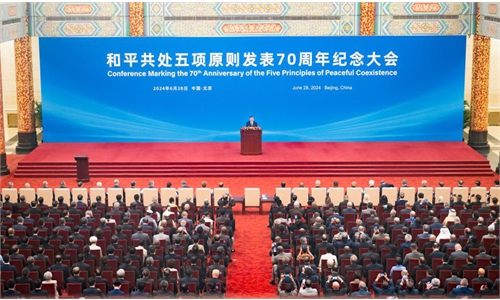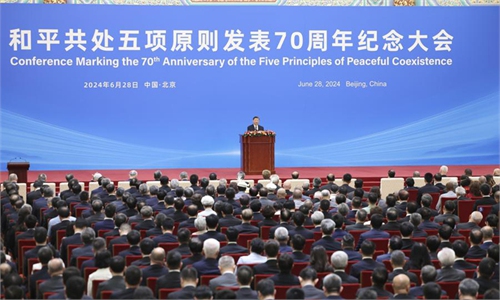Turbulent world needs more political wisdom from the Five Principles of Peaceful Coexistence

Illustration: Liu Xidan/GT
On June 28, China solemnly celebrated the 70th anniversary of the Five Principles of Peaceful Coexistence, which has attracted great attention from the international community.
For 70 years, the Five Principles of Peaceful Coexistence apply to the bilateral relations between countries, gradually adopted by various international documents. The principles are also included in the Constitution of the People's Republic of China and many diplomatic statements. The principles have shown different social systems, development levels and ideological differences of the basic principles of international relations and basic principles of international law. Gaining recognition across the international community, it has a lasting vitality and extensive influence in the world. At present, regional conflicts are intensifying, major power competition is rising, and geopolitical factors are intensifying. In the face of such a turbulent and changing world, the international community needs to seek more political wisdom from the Five Principles of Peaceful Coexistence.
Seventy years ago, the cloud of the Cold War shrouded the world, and "power is justice" filled every corner of the practice of international relations. For the first time, Chinese leaders fully proposed the five principles of mutual respect for sovereignty and territorial integrity, mutual nonaggression, noninterference in internal affairs, equality and mutual benefit, and peaceful coexistence. This was the important international public goods that China provided to the world under the background of the time, and contributed Chinese wisdom to the development and improvement of the international order. Once put forward, the Five Principles of Peaceful Coexistence quickly moved from Asia to the world, stood the test of the changing international situation, effectively safeguarded the rights and interests of other developing countries, and played a positive role in promoting the establishment of a more just and equitable international political and economic order.
The Five Principles of Peaceful Coexistence have long been enshrined in China's Constitution and have become the cornerstone of China's independent foreign policy of peace. It is by adhering to the general line of independence and peace that China has firmly defended its sovereignty, security and development interests and made significant contributions to the cause of world peace and development. As an open and inclusive principle of international law, the Five Principles of Peaceful Coexistence embody the values of sovereignty, justice, democracy and the rule of law. Its essence lies in its full equality of national sovereignty and the fact that countries with different social systems can achieve peaceful coexistence and friendly cooperation. The sovereignty of all countries, whether big or small, strong or weak, is inviolable. No country should interfere in the right of other countries to choose their own development path independently, nor interfere in the internal affairs of other countries under any pretext.
The Five Principles of Peaceful Coexistence describe the basic principles to be followed in modern international relations. Mutual respect for sovereignty and territorial integrity is the foundation, nonaggression and noninterference in each other's internal affairs is the guarantee, and equality, mutual benefit and peaceful coexistence are the goals. The three constitute a system of norms governing international relations with rich connotations and strict logic. Its essence is to oppose the hegemonism and the old thinking of power politics in international relations, as well as the old practice of the big bullying the small.
Seventy years later, facing the historical choice between peace and war and between prosperity and decline, China has also presented the international public goods of building a community with a shared future for mankind, reflecting China's unique views on the direction of human development, making steady progress in practice. The joint development of the Belt and Road Initiative, the Global Development Initiative, the Global Security Initiative and the Global Civilization Initiative has taken root, bringing prosperity and stable development expectations to the international community and creating solid benefits for people's livelihood. More and more countries and peoples have realized that this concept serves the common interests of all mankind and brings together the greatest common ground for building a better world.
Today, more than ever, the world needs to promote the Five Principles of Peaceful Coexistence and work together toward building a community with a shared future for mankind. History has proved, and will prove, that with every increase in China's strength, the hope for world peace increases. Over the past 70 years, why has China's foreign policy been widely recognized? It reflects the aspiration of people around the world to seek peace, seek cooperation and promote development, and conforms to the trend of the times and stands on the right side of history.
The author is a senior research fellow at the National Strategic Institute, Tsinghua University. opinion@globaltimes.com.cn



